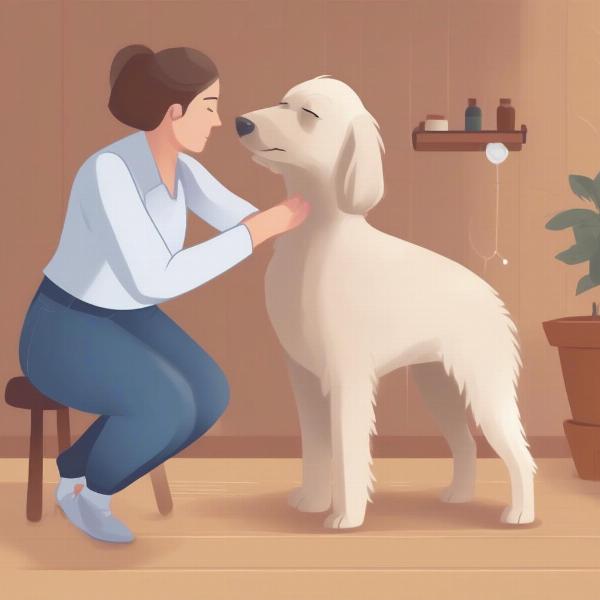Finding the right flea treatment for your dog can feel overwhelming. With so many products available, both over-the-counter and vet-prescribed, how do you know which one is best for your furry friend? This article will guide you through the different flea treatment for dogs vet options, helping you make an informed decision to protect your dog from these pesky parasites. We’ll cover everything from the importance of veterinary advice to the various types of treatments available, ensuring you have the knowledge to keep your dog flea-free and happy.
Why Consult Your Vet for Flea Treatment?
While many over-the-counter flea treatments exist, consulting your vet is crucial for several reasons. Your vet can assess your dog’s individual needs, considering factors like age, breed, health conditions, and lifestyle. They can also advise on the most effective treatment based on the local flea population and resistance patterns. Furthermore, your vet can help you identify the best preventative measures to minimize future infestations.
Types of Vet-Recommended Flea Treatments for Dogs
Your vet might recommend several types of flea treatments, including:
- Oral Medications: These chewable tablets or pills offer systemic protection, killing fleas that bite your dog. They are often highly effective and convenient.
- Topical Treatments: Applied directly to your dog’s skin, these solutions typically spread through the coat and kill fleas on contact.
- Flea Collars: These collars release insecticide over time, providing continuous protection. Some collars also offer protection against ticks and other parasites.
- Injections: In certain cases, your vet might administer an injection to provide rapid and long-lasting flea control.
Understanding Flea Life Cycle and Prevention
Effective flea control requires understanding the flea life cycle. Fleas have four stages: egg, larva, pupa, and adult. Targeting all stages is essential for complete eradication. Your vet can advise on environmental control measures, like regular vacuuming, washing bedding, and using flea sprays in your home and yard.
Choosing the Right Flea Treatment for Your Dog
The best flea treatment for your dog will depend on their individual circumstances. Your vet will consider factors like:
- Age and Breed: Certain treatments may not be suitable for puppies or pregnant/lactating dogs. Some breeds are also more sensitive to certain insecticides.
- Lifestyle: A dog that swims frequently might require a waterproof treatment.
- Severity of Infestation: A heavy infestation might require a more aggressive treatment approach.
- Other Health Conditions: Dogs with certain health problems may need specific treatments.
 Dog Receiving Flea Treatment
Dog Receiving Flea Treatment
What to Expect After Applying Flea Treatment
After applying flea treatment, you may notice some dead fleas on your dog. It’s important to continue monitoring your dog for any signs of fleas or adverse reactions to the treatment. Contact your vet if you notice any unusual symptoms.
Vet Flea Treatment for Dogs: FAQs
- How often should I apply flea treatment to my dog? Your vet will recommend the appropriate frequency based on the chosen treatment. This can range from monthly to every few months.
- Are vet-prescribed flea treatments safer than over-the-counter options? Vet-prescribed treatments are often more potent and tailored to your dog’s specific needs, offering a higher level of safety and efficacy.
- Can flea treatments prevent other parasites? Some flea treatments also offer protection against ticks, mites, and heartworms.
- What should I do if my dog has an allergic reaction to flea treatment? Contact your vet immediately if you notice any signs of an allergic reaction, such as itching, redness, or swelling.
- Can I use flea treatments on pregnant or nursing dogs? Consult your vet before using any flea treatment on pregnant or nursing dogs, as some ingredients may not be safe for puppies.
- How can I prevent fleas in my home? Regular cleaning, vacuuming, and washing bedding can help prevent flea infestations in your home.
- What are the signs of a flea infestation in dogs? Excessive scratching, biting, hair loss, and small black specks (flea dirt) in the fur are common signs of a flea infestation.
Related Articles
- vet flea treatment for dogs
- vet prescribed flea treatment for dogs
- vet prescribed flea treatment for dogs uk
- best flea treatment for dogs without a vet prescription uk
About ILM Dog
ILM Dog is your trusted resource for expert advice on dog breeds, health, training, nutrition, grooming, and much more. We offer comprehensive guides and practical tips to help you provide the best possible care for your canine companion. Whether you’re a new dog owner or a seasoned expert, ILM Dog has the information you need to navigate every stage of your dog’s life. For personalized guidance or to learn more about our services, contact us at [email protected] or +44 20-3965-8624. We are passionate about helping you build a strong and loving bond with your furry friend.